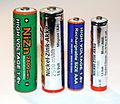A zinc–air battery is a metal–air electrochemical cell powered by the oxidation of zinc with oxygen from the air. During discharge, a mass of zinc particles...
26 KB (3,055 words) - 10:51, 14 October 2024
A nickel–zinc battery (Ni–Zn battery or NiZn battery) is a type of rechargeable battery similar to nickel–cadmium batteries, but with a higher voltage...
11 KB (1,341 words) - 03:03, 20 November 2023
Aluminium–air batteries (Al–air batteries) produce electricity from the reaction of oxygen in the air with aluminium. They have one of the highest energy...
11 KB (1,309 words) - 20:30, 26 June 2024
Inverter battery Lantern battery Nanobatteries Nanowire battery Local battery Polapulse battery Photoflash battery Reserve battery Smart battery system...
6 KB (203 words) - 17:16, 26 August 2024
Button cell (redirect from Coin battery)
used. Relatively high-power devices such as hearing aids may use a zinc–air battery, which has a much higher capacity for a given size, but dries out after...
29 KB (3,030 words) - 04:35, 4 November 2024
The lithium–air battery (Li–air) is a metal–air electrochemical cell or battery chemistry that uses oxidation of lithium at the anode and reduction of...
48 KB (5,283 words) - 03:02, 14 August 2024
Standard battery nomenclature describes portable dry cell batteries that have physical dimensions and electrical characteristics interchangeable between...
24 KB (2,406 words) - 05:48, 8 July 2024
is zinc-air batteries where the cell is sealed until use: a tab is removed to admit air and activate the cell.[citation needed] Reserve batteries may...
4 KB (532 words) - 14:13, 2 June 2024
fuel of the zinc–air battery/fuel cell. The zinc-cerium redox flow battery also relies on a zinc-based negative half-cell. A widely used zinc alloy is brass...
143 KB (16,230 words) - 16:55, 27 October 2024
batteries derive energy from the reaction between zinc metal and manganese dioxide. Compared with zinc–carbon batteries of the Leclanché cell or zinc...
23 KB (2,574 words) - 00:06, 4 November 2024






